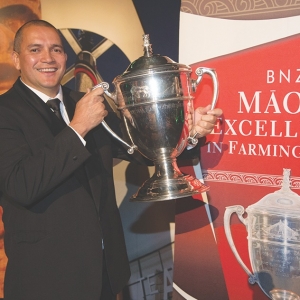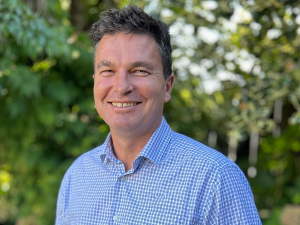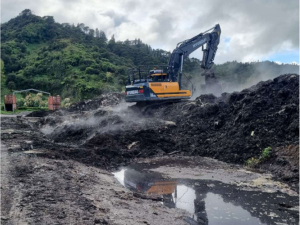Te Rua o Te Moko Ltd was one of three finalists in the competition, held each year. The other finalists were Putauaki Trust – Himiona Farm, and Ngati Awa Farms – Ngakauroa Farm, both located near Whakatane.
The farm trust’s chair Dion Maaka says its success validated the decision by 1100 owners to combine their land to establish the farm.
Maaka says it stood out because it was an amalgamation of four separate Maori trusts, representing at least 1000 landowners who combined their small, uneconomic blocks into one more viable dairy farm.
The 170ha farm is run by 50/50 sharemilkers Michael and Ruth Prankerd, whose 500 cows produced a record 190,000kgMS last season.
Maaka received the Ahuwhenua Trophy from Governor-General Sir Gerry Mateparae at an awards dinner in Tauranga earlier this month. He was also presented with a replica of the trophy by Primary Industries Minister Nathan Guy and the winner’s medal from BNZ chief executive Anthony Healy. The trust also receives about $40,000 in prizes donated by sponsors.
Maaka says bringing the blocks together into one large farm marked the beginning of a new era for the 1100 landowners and has given them an exciting vision for the future. “Individually the blocks were too small to be farmed economically, but as a collective unit they are able to provide a much better financial return for their owners.”
Te Rua o Te Moko Ltd also runs a training operation for descendants of shareholders whose lineage traces back to the land, and for other young people. Called Land Based Training, last year it graduated eight youngsters who then got jobs on dairy farms. Eight more are now in training.
Ahuwhenua Trophy management committee chairman Kingi Smiler says Te Rua o Te Moko Ltd was a shining example of how Maori are collaborating with small trusts cooperating to create larger, more economically viable enterprises which better serve local people and New Zealand.
“All the finalists were an amalgam of smaller entities which had put aside individual interests for the greater good of a larger whanau,” says Smiler.
“ This collaborative approach began 81 years ago when the Minister of Maori Affairs Sir Apirana Ngata encouraged Maori to work in this way. Today the collaborative approach [is] resulting in outstanding achievements.”
Smiler says Maori agribusiness has become a powerhouse of the New Zealand economy and has come of age, as shown every day as Maori trusts and incorporations are besieged by consultants, advisors and investors wanting to be a part of the action.
“One of the reasons for this is that trusts such as Te Rua o Te Moko Ltd, the other finalists and many others have lifted their game and become highly successful multimillion-dollar businesses.
“In the early years of the competition the winners were held up as great role models. The modern day finalists and ultimate winners are the same. Today they can benchmark successfully with all farms – not just Maori farms. They are adopting all the technologies modern farming has to offer.” But their “quest for financial gain [is not] at the expense of Maori values,” he says.
BNZ head of agribusiness John Janssen says that by amalgamating a smaller land holdings Te Rua o Te Moko is able to drive growth until now only achieved by larger land owners.
“Every year the Ahuwhenua competition highlights and shares innovative farming business practices driving growth in the agribusiness sector, and this year is no exception.”
















